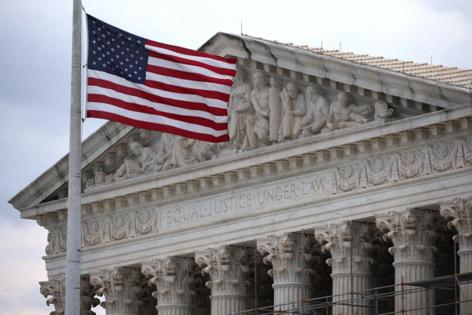Supreme Court appears to favor parents' right to opt out of LGBTQ+ stories for their children
Published in News & Features
WASHINGTON — The Supreme Court justices sounded ready on Tuesday to give parents a constitutional right to opt out of public school lessons for their children that offend their religious beliefs.
At issue are new "LGBTQ-inclusive" storybooks used for classroom reading for pre-kindergarten to 5th grade in Montgomery County, Maryland, a suburb of Washington where three justices reside.
In recent years, the court's six conservatives have invoked the "free exercise of religion" to protect Catholic schools from illegal job-bias claims from teachers and to give parents an equal right to use state grants to send their children to religious schools.
During an argument on Tuesday, they strongly suggested they would extend religious liberty rights to parents with children in public schools.
"They are not asking to change what is taught in the classroom," Justice Brett M. Kavanaugh told an attorney for the court.
"As a lifelong resident of the county, I'm mystified at how it came to this. They had promised parents they would be notified and allow to opt out" if they objected to the new storybooks, he said. "But the next day, they changed the rule."
Chief Justice John G. Roberts Jr. and Justice Neil M. Gorsuch also live in Montgomery County, and both have been reliable supporters of religious liberty claims.
Nearly every state, including Maryland and California, has a law that allows parents to opt out of sex education classes for their children.
When the new storybooks were introduced in the fall of 2022, parents were told their young children could be removed from those lessons. But when "unsustainably high numbers" of children were absent, the school board revoked the opt-out rule.
They explained this state rule applied to older students and sex education, but not to reading lessons for elementary children.
In reaction, a group of Muslim, Catholic and Ukrainian Orthodox parents filed a suit in federal court, seeking an order that would allow their children be removed from class during the reading lessons.
They said the books conflicted with the religious and moral views they taught their children.
A federal judge and the 4th Circuit Court refused to intervene. Those judges said the "free exercise" of religion protects people from being forced to change their conduct or their beliefs, neither of which were at issue in the school case.
But the Supreme Court voted to hear the parents' appeal in the case of Mahmoud vs. Taylor.
Representing the parents, Eric Baxter, an attorney for the Becket Fund for Religious Liberty, stressed they "were not objecting to books being on the shelf or in the library. No student has a right to tell the school which books to choose," he said. "Here, the school board is imposing indoctrination on these children."
Alan Shoenfeld, an attorney for the school board, said its goal for the new storybooks was "to foster mutual respect. The lesson is that they should treat their peers with respect."
He cautioned the court against adding a broad new right for parents and students to object to ideas or messages that offend them.
The Becket attorneys in their legal brief described seven books they found objectionable.
One of them, "Pride Puppy," is a picture book directed at 3- and 4-year-olds. It "describes a Pride parade and what a child might find there," they said. "The book invites students barely old enough to tie their own shoes to search for images of 'underwear,' 'leather,' 'lip ring,' (drag) king' and (drag) queen.'"
Another — "Love, Violet" — is about two young girls and their same-sex playground romance.
"Born Ready" tells the story of a biological girl named Penelope who identifies as a boy.
"Intersection Allies" is a picture book also intended for early elementary school classes.
"It invites children to ponder what it means to be 'transgender' or 'non-binary' and asks 'what pronouns fit you?'" they said. Teachers were told "to instruct students that, at birth, doctors 'guess about our gender,' but '[w]e know ourselves best.'"
They said teachers were instructed to "disrupt the either/or thinking" of elementary students about biological sex.
After the case reached the Supreme Court, two of the seven books were dropped by the school board, including "Pride Puppy."
©2025 Los Angeles Times. Visit at latimes.com. Distributed by Tribune Content Agency, LLC.







Comments